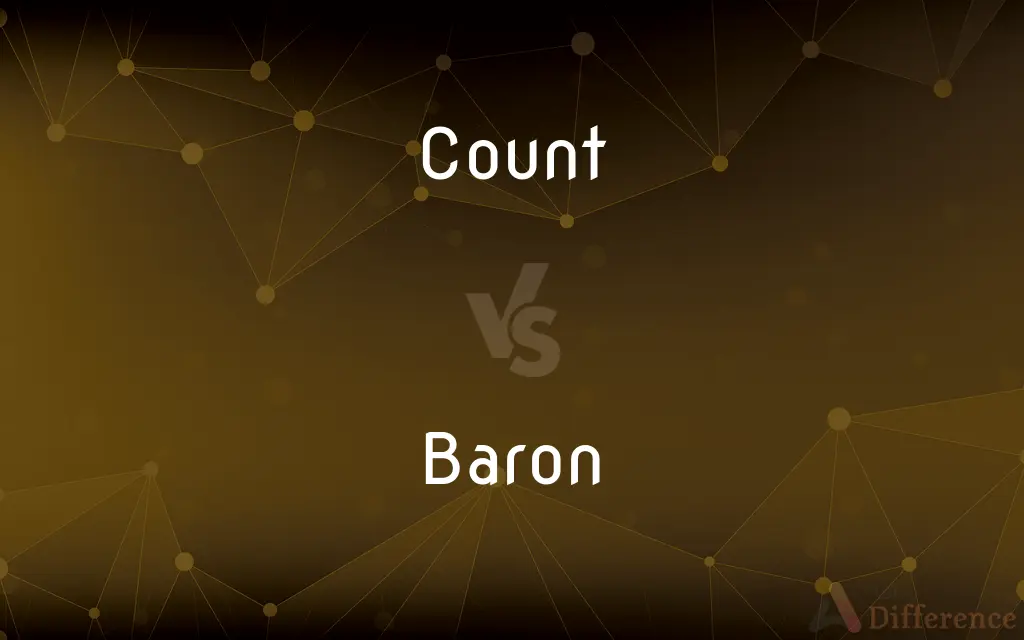Count vs. Baron — What's the Difference?
By Tayyaba Rehman & Urooj Arif — Updated on April 7, 2024
A count is a noble rank in European countries, equivalent to an earl in the UK, focusing on territorial management. A baron is a lower noble rank, often associated with landholding duties and military obligations.

Difference Between Count and Baron
Table of Contents
ADVERTISEMENT
Key Differences
A count is a title of nobility in many European countries, deriving from the Latin "comes," meaning companion or delegate of the emperor. Counts traditionally managed territories and had judicial and military duties. Whereas barons hold a title that is one of the lowest ranks of nobility. Originating from the Old German word "baro," meaning freeman, barons were initially landholders who served military roles under a king or higher noble.
Counts often had significant territorial control and were key figures in the feudal system, overseeing lands and acting as the king’s representatives. They had the authority to administer justice, collect taxes, and mobilize military forces within their jurisdiction. On the other hand, barons typically had more limited authority, overseeing smaller territories or specific domains. Their role was crucial in providing military support to their liege lord, including serving as knights or supplying soldiers.
The social status and privileges associated with being a count were higher than those of a baron. Counts were closer to the sovereign in terms of hierarchy and often had direct access to the monarch, reflecting their higher status and greater responsibilities. In contrast, barons, while still noble, occupied a more modest position within the social hierarchy, with their duties and influence generally confined to their immediate locality.
In terms of inheritance and title succession, both counts and barons could pass their titles and lands to their heirs, typically through primogeniture. However, the process and prerequisites for title succession could vary significantly between countries and over time, reflecting the evolving nature of noble titles.
Despite these differences, both counts and barons played vital roles in the feudal system, contributing to the governance, military, and social fabric of medieval society. Their responsibilities and influence shaped the political and social landscape of their time, underlining the complexity and diversity of noble titles and their impact on history.
ADVERTISEMENT
Comparison Chart
Origin of Title
Latin "comes," meaning companion
Old German "baro," meaning freeman
Rank
Higher noble rank
Lower noble rank
Duties
Territorial management, judicial, military
Landholding, military support
Territorial Control
Significant, often large regions
More limited, smaller domains
Social Status
Higher, closer to the sovereign
Lower, though still noble
Inheritance
Can pass titles and lands to heirs
Can also pass titles and lands to heirs
Compare with Definitions
Count
A noble title in European countries.
The count of Provence was known for his wealth and power.
Baron
A low-ranking noble title.
The baron of the shire had vast lands.
Count
A ruler or overseer of a county.
As count, he was responsible for the well-being of his territory.
Baron
A title denoting a landholding noble.
As a baron, he had numerous vassals under his command.
Count
A position associated with high social status.
The count was invited to all the royal gatherings.
Baron
Title can be inherited.
The youngest son hoped to inherit the baron title.
Count
Historically, a judicial and military leader.
The count led his troops to defend the region.
Baron
Often involved in military duties.
The baron trained his knights for the king’s service.
Count
Count (feminine: countess) is a historical title of nobility in certain European countries, varying in relative status, generally of middling rank in the hierarchy of nobility. The etymologically related English term "county" denoted the land owned by a count.
Baron
Has specific local influence.
The baron was influential within his domain.
Count
To name or list (the units of a group or collection) one by one in order to determine a total; number.
Baron
Baron is a rank of nobility or title of honour, often hereditary, in various European countries, either current or historical. The female equivalent is baroness.
Count
To recite numerals in ascending order up to and including
Count three before firing.
Baron
A member of the lowest order of the British nobility. Baron is not used as a form of address, barons usually being referred to as ‘Lord’.
Count
To include in a reckoning; take account of
Ten dogs, counting the puppies.
Baron
An important or powerful person in a specified business or industry
A press baron
Count
To include by or as if by counting
Count me in.
Baron
A British nobleman of the lowest rank.
Count
To exclude by or as if by counting
Count me out.
Baron
A nobleman of continental Europe, ranked differently in various countries.
Count
To believe or consider to be; deem
Count yourself lucky.
Baron
A Japanese nobleman of the lowest rank.
Count
To recite or list numbers in order or enumerate items by units or groups
Counted by tens.
Baron
Used as the title for such a nobleman.
Count
To have importance
You really count with me.
Baron
A feudal tenant holding his rights and title directly from a king or another feudal superior.
Count
To have a specified importance or value
Their opinions count for little. Each basket counts for two points.
Baron
A lord or nobleman; a peer.
Count
(Music) To keep time by counting beats.
Baron
One having great wealth, power, and influence in a specified sphere of activity
An oil baron.
Count
The act of counting or calculating.
Baron
A cut of beef consisting of a double sirloin.
Count
A number reached by counting.
Baron
The male ruler of a barony.
Count
The totality of specific items in a particular sample
A white blood cell count.
Baron
A male member of the lowest rank of English nobility (the equivalent rank in Scotland is lord).
Count
(Law) Any of the separate and distinct charges or causes of action in an indictment or complaint.
Baron
(by extension) A person of great power in society, especially in business and politics.
Count
(Sports) The counting from one to ten seconds, during which time a boxer who has been knocked down must rise or be declared the loser.
Baron
A prisoner who gains power and influence by lending or selling goods such as tobacco.
Count
(Baseball) The number of balls and strikes that an umpire has called against a batter.
Baron
A baron of beef, a cut made up of a double sirloin.
Count
A nobleman in some European countries.
Baron
Any of various nymphalid butterflies of the genus Euthalia.
Count
Used as a title for such a nobleman.
Baron
A husband.
Count
(intransitive) To recite numbers in sequence.
Baron
A title or degree of nobility; originally, the possessor of a fief, who had feudal tenants under him; in modern times, in France and Germany, a nobleman next in rank below a count; in England, a nobleman of the lowest grade in the House of Lords, being next below a viscount.
Count
(transitive) To determine the number of (objects in a group).
Count the number of apples in the bag and write down the number on the spreadsheet.
Baron
A husband; as, baron and feme, husband and wife.
Count
(intransitive) To amount to, to number in total.
Baron
A nobleman (in various countries) of varying rank
Count
(intransitive) To be of significance; to matter.
Your views don’t count here.
It does count if you cheat with someone when you’re drunk.
Baron
A British peer of the lowest rank
Count
(intransitive) To be an example of something: often followed by as and an indefinite noun.
Apples count as a type of fruit.
Baron
A very wealthy or powerful businessman;
An oil baron
Count
(transitive) To consider something as an example of something or as having some quality; to account, to regard as.
He counts himself a hero after saving the cat from the river.
I count you as more than a friend.
Count
(transitive) To reckon in, to include in consideration.
They walked for three days, not counting the time spent resting.
Count
To take account or note (of), to care (for).
Count
To recount, to tell.
Count
To plead orally; to argue a matter in court; to recite a count.
Count
The act of counting or tallying a quantity.
Give the chairs a quick count to check if we have enough.
Count
The result of a tally that reveals the number of items in a set; a quantity counted.
Count
A countdown.
Count
(legal) A charge of misconduct brought in a legal proceeding.
Count
(baseball) The number of balls and strikes, respectively, on a batter's in-progress plate appearance.
He has a 3–2 count with the bases loaded.
Count
(obsolete) An object of interest or account; value; estimation.
Count
The male ruler of a county.
Count
A nobleman holding a rank intermediate between dukes and barons.
Count
(entomology) Any of various nymphalid butterflies of the genus Tanaecia. Other butterflies in this genus are called earls and viscounts.
Count
Countable.
Count
To tell or name one by one, or by groups, for the purpose of ascertaining the whole number of units in a collection; to number; to enumerate; to compute; to reckon.
Who can count the dust of Jacob?
In a journey of forty miles, Avaux counted only three miserable cabins.
Count
To place to an account; to ascribe or impute; to consider or esteem as belonging.
Abracham believed God, and it was counted unto him for righteousness.
Count
To esteem; to account; to reckon; to think, judge, or consider.
I count myself in nothing else so happyAs in a soul remembering my good friends.
Count
To number or be counted; to possess value or carry weight; hence, to increase or add to the strength or influence of some party or interest; as, every vote counts; accidents count for nothing.
This excellent man . . . counted among the best and wisest of English statesmen.
Count
To reckon; to rely; to depend; - with on or upon.
He was brewer to the palace; and it was apprehended that the government counted on his voice.
I think it a great error to count upon the genius of a nation as a standing argument in all ages.
Count
To take account or note; - with
Count
To plead orally; to argue a matter in court; to recite a count.
Count
The act of numbering; reckoning; also, the number ascertained by counting.
Of blessed saints for to increase the count.
By this count, I shall be much in years.
Count
An object of interest or account; value; estimation.
Count
A formal statement of the plaintiff's case in court; in a more technical and correct sense, a particular allegation or charge in a declaration or indictment, separately setting forth the cause of action or prosecution.
Count
A nobleman on the continent of Europe, equal in rank to an English earl.
Count
The total number counted;
A blood count
Count
The act of counting;
The counting continued for several hours
Count
A nobleman (in various countries) having rank equal to a British earl
Count
Determine the number or amount of;
Can you count the books on your shelf?
Count your change
Count
Have weight; have import, carry weight;
It does not matter much
Count
Show consideration for; take into account;
You must consider her age
The judge considered the offender's youth and was lenient
Count
Name or recite the numbers;
The toddler could count to 100
Count
Put into a group;
The academy counts several Nobel Prize winners among its members
Count
Include as if by counting;
I can count my colleagues in the opposition
Count
Have faith or confidence in;
You can count on me to help you any time
Look to your friends for support
You can bet on that!
Depend on your family in times of crisis
Count
Take account of;
You have to reckon with our opponents
Count on the monsoon
Count
Inherited through lineage.
He became count following his father's death.
Common Curiosities
How does a baron differ from a count?
A baron is a lower-ranking noble than a count, typically with duties related to landholding and military service within a smaller domain.
Can a count’s title be inherited?
Yes, a count's title and associated lands can typically be inherited by the next of kin, often through primogeniture.
Is a count higher than a duke?
No, in the hierarchy of nobility, a duke is usually higher than a count.
Were barons part of the king’s court?
Barons, especially those of significant influence, could be part of the king’s court, though they were generally lower in the hierarchy than counts or dukes.
Did counts have their own armies?
Counts could raise and command their own armies, especially for the defense of their territories or service to their sovereign.
Could a baron be promoted to a count?
Yes, a baron could be promoted to a count, usually through royal decree, in recognition of service or to reflect an increase in land or power.
What is a count?
A count is a noble title used in various European countries, signifying a person of high rank with territorial, judicial, and military duties.
What were the main responsibilities of a baron?
Barons were primarily responsible for managing their lands, overseeing justice, and providing military support to their liege lord.
How did one become a baron in medieval times?
Nobility titles like baron were often granted by a king or a higher noble, usually in recognition of military service or loyalty.
What role did counts play in the judicial system?
Counts often had judicial authority within their territories, including presiding over courts and enforcing laws.
What impact did counts and barons have on medieval society?
Counts and barons were integral to the feudal system, influencing governance, military campaigns, and social structures of medieval society.
What is the female equivalent of a count?
The female equivalent of a count is a countess.
Do counts and barons still exist today?
While the political and administrative roles of counts and barons have largely diminished, the titles still exist as ceremonial honors in some countries.
How were disputes between counts and barons resolved?
Disputes between counts and barons were typically resolved through the king’s court or through mediation by higher nobility.
Could a baron own multiple castles?
Yes, a baron could own multiple castles, especially if they were powerful and wealthy.
Share Your Discovery

Previous Comparison
Druid vs. Shaman
Next Comparison
Faculty vs. FacilityAuthor Spotlight
Written by
Tayyaba RehmanTayyaba Rehman is a distinguished writer, currently serving as a primary contributor to askdifference.com. As a researcher in semantics and etymology, Tayyaba's passion for the complexity of languages and their distinctions has found a perfect home on the platform. Tayyaba delves into the intricacies of language, distinguishing between commonly confused words and phrases, thereby providing clarity for readers worldwide.
Co-written by
Urooj ArifUrooj is a skilled content writer at Ask Difference, known for her exceptional ability to simplify complex topics into engaging and informative content. With a passion for research and a flair for clear, concise writing, she consistently delivers articles that resonate with our diverse audience.














































